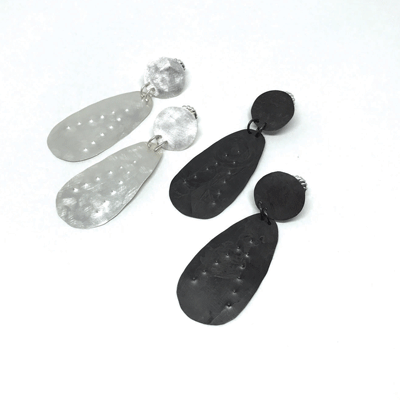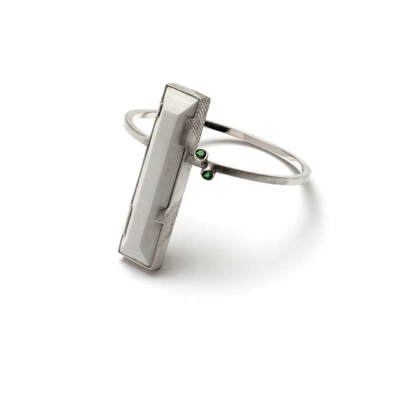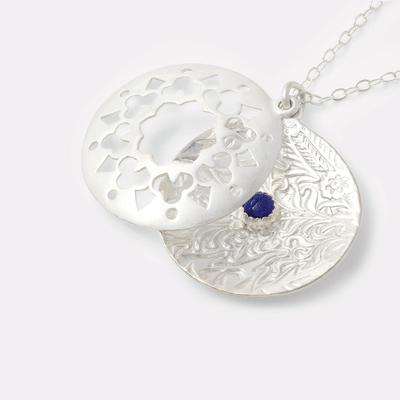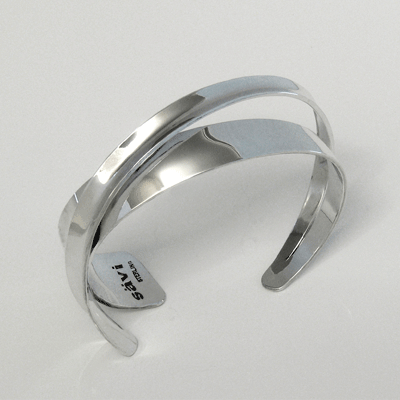Sterling silver is firmly ensconced once more as an integral part of the in-store display of most jewellers following a steady rise in popularity over the past couple of decades. While a few socio-economic factors have contributed to this resurgence, it is silver’s affordability and fashion status that are the main reasons for its popularity.
The Global Financial Crisis (GFC) was one factor that contributed positively to the status of sterling silver when the soaring price of gold forced manufacturers to switch to white metals. Sterling silver has subsequently become an important part of any jewellery lover’s collection even if it may not yet be considered as ‘cool’ as some other precious metals.
Perceptions still exist of silver as an old-fashioned metal, probably because it has historically been limited to safe, classic designs; however, this is changing as suppliers appeal to Danish and European silver houses for fresh, modern and even innovative collections that can help fuel recent demand. Fabuleux Vous is one such brand doing just that, releasing silver collections set with semi-precious stones. Managing director Helen Thompson-Carter says suppliers must strive to offer a point of difference in what she believes is a “sterling silver saturated market”.
“Silver as a metal and as a product is very interesting; the demand for silver is huge and there is an existing saturation we are seeing right now,” she says. “One of the challenges for retailers is that they are looking for something that is tried and tested, rather than looking for true innovation, but if you’re looking for something that’s tried and tested then you’re only looking to stock exactly the same thing that’s on offer down the road."
A point of difference
It is very easy for suppliers to aspire to distribute collections that offer their retailers a point of difference; it is much more difficult to achieve it. For West End Collection’s general manager John Rose, the key has been to look at neighbouring countries.
West End Collection launched New Zealand brand Stolen Girlfriends Club in Australia late last year. The label has been successful in the land of the long white cloud for six years and is the brainchild of two fashion designers. Rose says the brand appeals due to its unique aesthetic qualities and “edgy” appearance, setting it apart from many other sterling silver brands.
“The founders created Stolen Girlfriends Club as an art exhibition and people loved the name of the art show so much that they carried it across to their jewellery brand,” Rose says of the silver collection’s creation.
The line incorporates traditional cross motifs but also showcases a range of crystal skulls, bows and hearts with “stolen” engraved within them.
“We’ve got quite a few retailers now carrying Stolen Girlfriend and it gives them a real point of difference in their store compared to the finer, more traditional silver lines,” Rose adds. “People gravitate towards it because it’s quirky and it’s a bit of fun.”
New Zealand jewellers are also making waves with modern sterling silver jewellery. Benjamin Black Goldsmiths creates custom jewellery pieces while its sister fashion label Black Matter produces “demi-fine fashion pieces” in sterling silver. Owner Benjamin Clark says sterling silver is an ideal metal given its durability.
“Sterling silver is not only a fantastic price point for consumers; it’s great to work with. As manufacturing jewellers, this means we can create beautiful handmade designs for people at an achievable price. It’s also a durable metal and lasts really well,” Clark says, adding that the business produces pieces with recycled materials to offer a point of difference to environmentally conscious consumers.
“For us, we have started recycling and reusing metals wherever possible. Most of our sterling silver jewellery, especially with Black Matter, is made from recycled silver. Consumers are becoming more aware of where their products are made, how and by whom. Having an ethical conscience and being aware of how what we do affects our people and our planet is really important.”
One local business looking to not only offer a point of difference, but also make a difference in the world is Bella Donna Silver. Manager Donna Quinn said she started the business in 2003 providing, employment to jewellers in Indonesian islands and raising funds for orphanages.
“Our jewellers mostly work from home in what is called the ‘cottage craft’ industry. A lot of our jewellers work in their homes and make our jewellery in sterling silver,” she explains.
“It means that if their wives work, the kids come home from school and their dads are at home working, which is a nice environment. Most of the kids that are part of the family of jewellers who work for us have nice lives, but there are a lot orphans in these countries. So for years we’ve wanted to make a difference and help these kids have a bright and hopeful future.”
The Bella Donna Silver collection is known for its Harmony Balls collection, which has helped one of its founding jewellers move from living in lower class to owning four properties, just one of the many success stories to come from the business model.
Nowadays, Bella Donna features a wide range of sterling silver products covering “trendy, flavour of the month styles”.
Mexican silver is another precious metal which offers high quality products in the sterling silver category. Ironclay Silver’s Adriana Corti says the business produces handmade pieces from skilled silversmiths in Mexico.
“We cater for a lot of different tastes from very modern to traditional and classic designs so there is something for everybody. We have a big selection of mixed metals as well. I have an artist who works with silver and copper and silver and brass,” she says.
“Mexico has a very rich history of silversmithing. Silver jewellery is fabulous because you can get really amazing pieces without having to pay the cost of gold.”
Aztec Gold & Silver’s Susan Campbell has offered pieces in white metal for decades and has found success in her Blooming Daisy collection, a sterling silver floral arrangement with a gold plated centre. In recent times she came across a new technique produced by a silversmith in Europe.
“He casts the silver and then sprinkles organic powder in a variety of colours onto the metal and puts it back in the kiln to bake the colour into the jewellery. He does the colouring with his partner in one room so the other silversmiths he works with don’t know how he does it, he has a very secretive way of doing things,” she explained.
“He spent years and years testing it and he keeps producing these amazing designs and I think they look quite amazing. They are very different to anything else that’s on the market at the moment.”
Offering a point of difference has also been a factor to the success of sterling silver products at Pastiche. Director Amy Bradley says the company has expanded its silver offerings.
“We’ve enjoyed being creative in layering delicate styles and adding colour with gorgeous natural stones. We’ve also seen a trend towards fine yellow gold-plated designs which we are excited about,” she says.
The latest collection includes shoulder-skimming chain earrings, y-chain strand necklaces and pendants in silver and yellow gold plating, which have already proven to be big sellers.
“Sterling silver is an easy metal to work with in the manufacturing process which allows us to create interesting, on-trend and innovative designs that our consumers love,” Bradley says.
Inter-generational strength
That doesn’t mean consumers have steered away from classic designs altogether. Melbourne supplier Moore Jewels has a range of sterling silver and gold-plated pendants and earrings that manager Christina Harold describes as “the bread and butter of jewellery”.
“I started working for a high-end jeweller well before sterling silver gained momentum. In the time since its rise, it has remained very popular and has become a staple in most people’s jewellery collection,” she says. “Sterling silver will continue to be popular well into the future, and I don’t see it changing anytime soon.”
Offering a range of both on-trend and core jewellery pieces is a business model that has been effective for Cocktail Jewellery. The business’ agent Heidi Plentinger says the collection’s quality and lower price point make it an attractive choice for consumers.
“The strong point about Cocktail is that it’s made to European standards, so it is a nickel free and rhodium plated quality product. It can fit in with any existing silver ranges or it can be a range on its own. It can fit into any jewellery store,” she says.
“I think why jewellers continue to sell sterling silver is because the price point is low, these kinds of products have higher profit margins. The white metal is an attractive metal and suits a lot of skin tones and its lower price point makes it more accessible to consumers.” Couture Kingdom supplies Disney-trademarked jewellery, rhodium-plated sterling silver collections that are popular among both children and adults. Managing director Michael Tran says the perception of sterling silver across all consumer demographics is that it is a precious metal ideal for producing quality jewellery.
“We believe that customers remain attracted to purchasing sterling silver as it is still considered a prestigious precious metal. As such we have invested in premium packaging to differentiate our sterling silver, stainless steel and gold-plated products,” Tran says.
“Our sterling silver precious metal range remains one of our bestselling lines. It offers a premium product, display unit and packaging at an affordable price point.”
Notwithstanding its affordable price tag, silver’s association with luxury is what Bradley believes to be the driving force for strong sales, particularly over the past decade.
“The allure of silver is the inherent beauty of the precious metal together with its affordable price tag,” she says. “It carries the association of a classic, luxury product while remaining affordable for consumers and able to be used creatively by designers to make new and exciting pieces that make a statement.”
Rose recognises that there will always be two consumer groups: those looking for something classic and safe, and others looking to stand out with unique pieces in their collection. He feels sterling silver will continue to appeal to both groups in the foreseeable future.
“I don’t think the traditional customer is ever going to go away but there’s always going to be a very strong element of the customer base that’s looking for something original and different,” he says.
“Either way, sterling silver is a very stable category within the jewellery market.
It’s not really showing any signs of slowing down and we’re going to continue to see new brands coming into the market that will create different and edgy designs.”
Queensland’s Daniel Bentley designs his namesake brand with wife Lene. The pair have made a name for themselves producing sterling silver products that emulate Australian and Danish jewellery styles. Daniel Bentley is distributed in Australia and Denmark as well as in Sweden and New Zealand.
“Silver has cemented its position in the jewellery market because of the competitive advantages it has. It is a precious metal with a very long history, and this carries weight over lesser, more industrial metals like steel,” Bentley says.
“Established higher-end jewellery brands have turned their attention to silver in an effort to offer products that cater for entry-level clients. More established design houses like ours have solidified their position with silver design at the forefront because of the design and manufacturing advantages it allows.”
Take a risk
In the near future, Thompson-Carter believes the onus will be on retailers to seek out unique product offerings without relying on big brands to push for innovation.
“I think silver is strong; I think the longevity of the metal and the freshness of the space is strong; I think retailers need to be reminded that there are no rules around how creative you can be. We are seeing brands produce more fine statements and we are now stepping outside the comfort zone in being prepared to use more precious stones. Retailers need to be jumping on those brands,” she says.
Daniel Bentley carries a vast range of silver products in contemporary designs that reflect Bentley’s fascination for Danish design. The brushed and polished metals create a contrast and the collection spans organic shapes and sharp, geometric designs.
“Every year, we create a new, original silver range and add this to our catalogue of contemporary jewellery that we offer our clients. Our job is to make collections that stand out of the crowd for their unique design and quality and to ensure that our clients know the origin and the inspiration behind our themed pieces,” Bentley says.
“We combine silver with gold, diamonds, coloured gems and pearls to highlight the forms, though it’s evident that silver is the focus.”
Clark says his latest collection of knotted pieces at Black Matter have been very successful with stockists across Australia, New Zealand and the US: “Our most popular piece is The Statement Ring by Black Matter. This collection is hammer-finished and it looks incredibly striking in sterling silver, which is why it’s a best seller.”
Thompson-Carter says more suppliers are looking to push the boundaries with the robust, white metal. While it can already be seen stocked by most jewellers, the next step for retailers is to think outside the square.
“If you are a retailer looking for an innovative product, there are plenty of quirky little boutique brands out there with designs that have come from a pencil and paper, rather than from mass manufacturing,” she says. “A few years ago, we were seeing sales of 300 per cent more silver than gold. I don’t think consumers’ desire to own sterling silver pieces is going to go away.”
Sterling silver may not be a new sector of the jewellery industry but it certainly remains a strong one. There are so many avenues to invest in stocking sterling silver and the key is to think a little differently.
Standing out in sterling
Here are some local artisanal jewellers making silver with a fresh new take:
 Melbourne’s ROBYN WILSON handmakes her sterling silver creations in bold shapes with enamel and titanium finishes. Melbourne’s ROBYN WILSON handmakes her sterling silver creations in bold shapes with enamel and titanium finishes.
“When starting out, it was a much more affordable precious metal to work with and therefore my finished pieces were more affordable,” she says. “I was introduced to Argentium silver quite a few years ago and I now use it in a lot of my work, especially my granulated pieces as it fuses beautifully.” Fellow Melburnian LAUREN TROJKOVIC uses traditional metalsmithing techniques and wax casting to produce her collection of large statement pieces. She credits sterling silver’s malleability and the ability to be easily engraved as benefits; however, she incorporates colours into her pieces using various materials. wax casting to produce her collection of large statement pieces. She credits sterling silver’s malleability and the ability to be easily engraved as benefits; however, she incorporates colours into her pieces using various materials. “I use precious gemstones and the acrylic polymer Corian in my work to add form and colour. Corian is most commonly used as a benchtop material in kitchens and bathrooms but is a versatile and lightweight alternative in jewellery,” she says. “I find inspiration from the graphic shapes and elaborate embellishment seen in ethnic jewellery from Africa, India and South America.”  Adelaide Hills designer SIMONE WALSH produces “alchemic, yet delicate” collections in sterling silver, incorporating gold and gemstones. Adelaide Hills designer SIMONE WALSH produces “alchemic, yet delicate” collections in sterling silver, incorporating gold and gemstones.
“I love the slightly warm look of silver,” she says. “Given that I’ve been working with it for about 25 years, sterling silver is the metal I know best; it feels a bit like an old friend when I’m working with it.” Sterling silver has proven to be an ideal metal for producing images that emulate ornamental details from different cultures and historical periods in her work: “I think the colouring suits most people, and it plays well with a very wide array of gemstone colours too. It’s also a very affordable precious metal, which makes it much more accessible for customers and also for small-scale designers and makers.” Working out of Savi Jewellery in Noosaville, Queensland, GERHARD HERBST’S jewellery designs incorporate unconventional shapes and forms using sterling silver, as well as 9, 14 and 18-carat gold. unconventional shapes and forms using sterling silver, as well as 9, 14 and 18-carat gold. “Sterling is a quality material. I appreciate the material for its working properties and its finish. It’s also a commodity metal and has been used along with gold as a store value for thousands of years,” he says. “Over time, real silver jewellery will always hold its value,” he believes. “I also like sterling for its colour and price point. It has real value and allows me to create quality pieces within an affordable price range.” Herbst has been designing jewellery for 30 years and continues to strive to create unique and challenging pieces. “I am inspired by shape and forms,” he says. “I try to find ways to incorporate new and unconventional forms into the medium and format of jewellery.” |